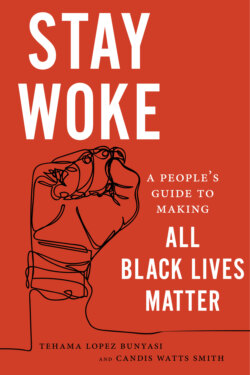Читать книгу Stay Woke - Candis Watts Smith - Страница 11
На сайте Литреса книга снята с продажи.
FAQ
ОглавлениеWait a second. . . . Aren’t there a disproportionate number of Black people in prison because they commit a disproportionate amount of crime?
No. Let’s take a step back. We focus here on the disproportionate amount of Black and Latinx people in prisons and jails in order to highlight the inequities rooted both in the law as written and in the way the law is implemented. But generally speaking, when a person asks a question like the one above, they are asking if Black people are simply more prone to criminal behavior than other groups. The answer to that question is also no.
When we think about issues of crime and race, we have to keep in mind that we do not live in a vacuum. We have to consider the context. For example, the War on Drugs has had a disproportionate impact on communities of color. More communities of color, especially poor communities, were surveilled, and thus more people of color were arrested. Another way of thinking about this is that whites are systematically underrepresented in prisons due to drug-related crimes. Whites report doing more illegal drugs than Blacks do, but Black people are more likely to be punished for doing so. Research shows that contexts matters a great deal, and when scholars control for things like income and wealth,30 nearly all of the things that people believe are distinctly pathological for Blacks, such as “culture,” go away. Or in other words, once we account for poverty and wealth, Blacks and whites behave about the same way, but there are simply a greater proportion of Blacks who are poor and lack wealth.
Second—let’s just get this out of the way—it is true that a Black person who is murdered is most likely to be murdered by another Black person, but there is also such a thing as “white-on-white” crime. If someone is going to kill (or rape) you, he or she probably already knows you. Aside from being incredibly disturbing, this statistic is fascinating because what it really reveals is how segregated a society the United States is.
Inter- and intraracial homicides. (Baumgartner, Grigg, and Mastro, “#BlackLivesDon’tMatter,” 213)
Third, according to the FBI, there were about 7.5 million people arrested for about three dozen crimes in 2015—ranging from violent crimes to vagrancy—so there are very few people, relatively speaking, who commit crimes. But we spend a lot of time thinking not just about crime but also about the supposed racial nature of crime. It’s true that there are some crimes that Black people are disproportionately arrested for and also more likely to be victims of, such as homicides. But there are some crimes that white people are most likely to be arrested for. Driving while under the influence, for example, is a crime that is disproportionately committed by whites, usually men. But whites are also most likely to be arrested for rape, violent crimes, property crimes, arson, and drug crimes. In fact, whites are more likely to be arrested for crimes, generally speaking.
Arrests in Black and white. (Data compiled from FBI Uniform Crime Reporting, 2015)
All in all, we would like to encourage you to think about why some crimes (or crime, generally speaking) are racialized as “Black” and are erroneously linked with “Black culture.” Furthermore, given that whites are more likely to be arrested, what are the factors that may prevent us from even considering the notion of white criminality? Why are crimes that are most likely to be committed by whites chalked up to the individual or seen as an aberration (e.g., mass school shootings, serial killing), rather than as a sign that there is something wrong with white people? Or, in other words, what are the implications of focusing on disproportionality by population size rather than probability of occurrence by people across age, gender, ethno-racial, or class groups?31 How would our discussions and policy recommendations change if we did shift our focus?
—
